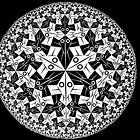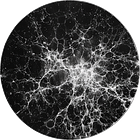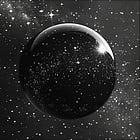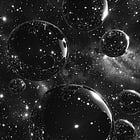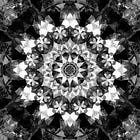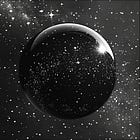Introduction
Welcome to The Magical Flower of Winter. This is an essay series exploring reality and our relationship to it by investigating topics in philosophy and science, and by questioning our knowledge about the world and ourselves. I consider the essays published so far a first pass over a terrain of ideas that are of one whole, a whole that can be approached from a variety of directions, only some of which are attempted here. This collection is inevitably just a summary, a coda of a sort, as practically each essay is deserving of its own book or books. My approach has been to cover a vast landscape that is intricately connected, of which each piece is equally important, but the scope of which might escape most people’s attention and stamina. What I hope to have achieved is to satisfactorily sketch the outline of something larger, to give a range of viewpoints on the same underlying subject matter that in combination are able to illuminate it sufficiently for our vision to see it. I pray that my failure in thoroughness is made up for in terms of the whole that I have attempted to bring into view.
Two threads interweave this project. First is an investigation of what reality and our relationship to it is. Second is an attempt at framing a problematic, the modern crises, identifying the deepest roots of these crises, and outlining a path away from them. What the project in part shows is that these two seemingly separate threads are intertwined. A condensed summary of what is found is: Reality is the holistic union of our experiences. Experience is primary, the transparent stage to all that we know, feel, see, touch, and so on. The dominant world view of modernity, what I term particularism, sees this relationship inverted. This inversion is the chief “cause” of the plethora of modern crises and our fragmentation as individuals and a society intimately dependent on our environment. I suggest that in order to depart from this path of self-destruction we need a radical shift in our world view that is coherent and harmonious with the primacy of experience and the holistic nature of reality. Furthermore, our world views, understood as the uniquely contextual and immersive way we experience reality, are far more powerful than we naively think.
I have put “cause” in quotation marks in the above paragraph in order to distance the identification of the inversion from our treating it in causal terms. The inversion cannot be truly isolated from its effects, nor from what can be conceived as its preceding causes, all of which is a consequence of holism: causal frameworks, as any framework, is applied to our experience after the fact and on our experience as fragmented, while reality is a whole in the making. I must also remark that I offer no solutions to this inversion, other than pointing out that to change reality we must change our view of it.
If this is your first foray into philosophy, or outside academic research or popular science, I must ask for patience and for keeping one’s mind open. Part of what this project aims to show is that there is a limit to what can be said, something I think we are all fully aware of intuitively, but which is brushed aside in many areas of discourse. This brushing aside is intricately connected to the inversion of modern science, a science that in its most extreme corners would deem it irrational to believe that its paradigm wasn’t the path to “ultimate knowledge”. What I argue is not an abandonment of this paradigm, but of seeing where it cannot reach, balancing and guiding it with a philosophy and understanding of nature and reality coherent and aligned with our experience, survival and thriving.
Just as the investigation impacts the investigated, writing changes what one intends to write about. Much of this first phase was planned out in advance, but an appreciable part also came out of the act of writing itself, connections and observations realizing themselves without any prescience. This, as so much else, I view as a consequence of the archetypal aspect of our experience of reality as immersive, our inseparability from experiencing and from experiencing contextually. Our circumstances uniquely shape each of us, and in turn we uniquely shape reality co-creatively.
First Phase
This section, subject to change, will briefly introduce the essays published in the first phase.
My first essay introduces the project, and is perhaps the most natural entry point to understanding more about the theme and motivations behind this work.
The next tackles some metaphysical terms and concepts that are explored and revisited throughout. The epistemic is the what of experience, while the ontic is the that-ness of experience, that there is such a “thing” as us having an experience. I here start to introduce some of the holistic aspects of my view.
We now enter the philosophy of language. I take a look at how language and meaning works1, and what this says about metaphysics and our relationship to reality. I provide more aspects of holism, and I introduce the term epistemisation, which is used throughout the rest of the series.
I take a break in the progression and provide some thoughts about the project as a whole.
The next essay leaps ahead and deals with one of the main motivations for this project: the fragmentation of our world, and the beginnings for how it can be made whole again.
Entering the philosophy of science, I give an account of explanation and constructivism that provides a platform for discussing incommensurability, world views and epistemisation in more depth. The nature of world views provides an understanding of reality as the kaleidoscopic union of our experiences.
Given the nature of reality that so far has been outlined, and our relationship to it as thinking, intelligent experiencers, what can be said about the progress and aims of artificial intelligence? I claim that the fundamentally particularist approach to AI precludes any implementation of artificial wisdom, and that this places an enormous burden on us, humanity, to be the regulatory mechanism.
What clues about reality as a whole can be gleaned from the foundations of physics? I provide an introduction to those aspects of quantum theory and relativity that highlight the holistic nature of reality, focusing on entanglement, non-separability, background independence and general covariance.
Do we experience the world directly or a representation of it made by our brain? Does framing the question in this (common) way presuppose the wrong structure of reality?
The final four essays of the first phase start out by discussing experience, the primary given, the stage on which the world comes about.2 I put the meaning of the question of experience as preceding the question of being, and I revisit the epistemic and the ontic in the context of the philosophies of Heidegger, Husserl, Bergson, James and Ortega y Gasset. We are immersed in experience, and experience is pluralistic, which leads to the primacy of the continuum over the parts we abstract from it, as well as the perenniality of philosophy and our epistemic endeavors.3 The penultimate essay of the first phase may provide a good entry point to the project as a coda of the view I am outlining. The final essay details and argues for the ontological, metaphysical and philosophical view of holistic panenexperientialism.
Second Phase
The second phase aims its attention at the metacrisis.
Metaergographic Mesolog
Metaergographic mesolog - a pause that gives the chance to write about the work itself in the midst of it being written (meta - after/beyond, ergo - work/project/deed, graphos - written, meso - middle, log - word).
I now consider a first phase fulfilled, having visited many of the areas I intended to. Many deserve revisiting, as I have only had a chance to scratch the surface in some cases, while there are also areas I have merely alluded to or not visited at all. Whether these will be part of the next phase is at present undecided, just as what the next phase will be at all is currently open. I take this pause as an opportunity to provide some possibilities for what may come.
The name of the project, The Magical Flower of Winter, comes from Roberto Bolaño’s 2666, a book I first read in 2015. The phrase stuck in my head and percolated for a long time for reasons unspecifiable, while my philosophical interests (which I did not realize at the time were philosophical) developed. In the spring of 2023 I took a leap into these interests full-time, which after a while progressed towards an aim of writing something. The result is, for now, this essay series.
The Magical Flower of Winter started out as the name for an idea I had for a piece of fiction. Part of what my philosophical “investigations” started out as was in part a research into the backbone of this piece of fiction. What “world” did I want it to depict, what “truths”, what “morals”? This research turned into a consuming enterprise, and what was intended as the philosophical backbone to something else, turned into the thing itself. The piece of fiction has however resurfaced several times throughout the process, as I have become aware of new and more levels or ways the piece can work. At present I have the sense of a completely new context in which the piece can be made to work, which is now one avenue I am currently exploring, among several others.
To say something about areas of this project or essays that have not been developed yet, here is a highly provisional list. Providing this in no way indicates that these will be written in the near future, but they could be, depending on where the next phase takes me.
Loops and Limits. In what ways does logic, mathematics and language show forth their own limits? This informs the distinction between the epistemic and the ontic. Key topics would be set and model theory, the continuum, logical paradox, the Löwenheim-Skolem Theorem, Gödels Incompleteness Theorem etc.
Entropy: A Case Study in Meaning Plurality (Polysemy). An investigation into the many meanings of entropy, in particular in the contexts of information, thermodynamics, black holes, gravity and as individual variability. What potential is there for drawing fallacious parallels between these many meanings? What are some examples of these fallacious parallels?
Questions in the Foundations of Physics.
What is the status of quantum gravity approaches like string theory and loop quantum gravity in the light of the view of reality I am outlining?
More on the nature of time.
If and how quantum and relativistic effects can be interpreted as “natural” (i.e. coherent or intrinsic) phenomena to expect from a holistic view of reality.
The Metacrisis and Collapse. A topic I have dealt with in a couple of essays, that may deserve more treatment.
Thank you for reading! If you enjoyed this or any of my other essays, consider subscribing, sharing, leaving a like or a comment. This support is an essential and motivating factor for the continuance of the project.
Since this was published I have been made aware of and seen a connection between the conception of language and meaning I am outlining and Brandom’s work. His project sees reasoning as rising out of social practice, from which epistemic, semantic and cognitive features arise holistically and normatively. See e.g. Loeffler, R. (2018). Brandom. Polity Press.
I am currently reading Merleau-Ponty’s Phenomenology of Perception, which seems highly relevant to the position I am sketching.
I have also been made aware of a link to Peirce’s work. He was the father of pragmatism, something I discuss in several essays, and his synechism and fallibilism I take as parallels to the tension/continuum and the perenniality I discuss in the three final essays. See e.g. https://philosign.substack.com and Peirce, C. S. (1992). The Essential Peirce (2 vols. Eds. Houser, N. & Kloesel, C. J. W.). Indiana University Press.





